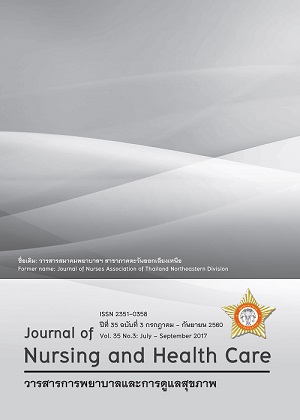ผลของโปรแกรมการพยาบาลครอบครัวผู้ป่วยโรคหลอดเลือดสมองระยะหลังจำหน่ายออกจากโรงพยาบาลต่อการปรับตัวของครอบครัว Family Intervention Program/ Family Adaptation/ Cerebrovascular Disease Patients After Discharge From the Hospital
คำสำคัญ:
โปรแกรมการพยาบาลครอบครัว การปรับตัวของครอบครัว ผู้ป่วยโรคหลอดเลือดสมองระยะหลังจำหน่ายออกจากโรงพยาบาล family intervention program family adaptation cerebrovascular disease patients after discharge from the hospitalบทคัดย่อ
บทคัดย่อ
การศึกษากึ่งทดลองนี้ มีวัตถุประสงค์เพื่อศึกษาผลของโปรแกรมการพยาบาลครอบครัวผู้ป่วยโรคหลอดเลือดสมองระยะหลังจำหน่ายออกจากโรงพยาบาลต่อการปรับตัวของครอบครัว กลุ่มตัวอย่าง คือ สมาชิกครอบครัวผู้ทำหน้าที่ดูแลหลักผู้ป่วยโรคหลอดเลือดสมองระยะหลังจำหน่ายออกจากโรงพยาบาล จำนวน 32 ราย เลือกด้วยวิธีสุ่มอย่างง่าย เข้ากลุ่มทดลองและกลุ่มควบคุม กลุ่มละ 16 ราย กลุ่มทดลองได้รับโปรแกรมการพยาบาลครอบครัวผู้ป่วยโรคหลอดเลือดสมองระยะหลังจำหน่ายออกจากโรงพยาบาล 2 ครั้ง ครั้งละ 90 นาที กลุ่มควบคุมได้รับการพยาบาลตามปกติ เก็บรวบรวมข้อมูลก่อนและหลังการทดลอง ด้วยแบบสอบถามการปรับตัวของครอบครัว วิเคราะห์ข้อมูลโดยใช้สถิติ การแจกแจงความถี่ ค่าเฉลี่ย ส่วนเบี่ยงเบนมาตรฐาน สถิติทดสอบค่าทีและสถิติไคสแควร์
ผลการวิจัยพบว่า กลุ่มทดลองมีคะแนนเฉลี่ยการปรับตัวของครอบครัวหลังทดลองสูงกว่าก่อนทดลองอย่างมีนัยสำคัญทางสถิติ (p < .001) และกลุ่มทดลองมีคะแนนเฉลี่ยการปรับตัวของครอบครัวหลังทดลองสูงกว่ากลุ่มควบคุมอย่างมีนัยสำคัญทางสถิติ (p < .001)
Abstract
The purpose of this quasi - experimental study was to examine the effect of family intervention program of cerebrovascular disease patients after discharge from the hospital on family adaptation. The samples of 32 family caregivers were recruited and randomly assigned into the control (n = 16) and experimental group (n = 16). The experimental group received two weekly ninety - minute sessions of family intervention program of cerebrovascular disease patients after discharge from the hospital. while the control group received regular nursing care. Caregivers’ family adaptation interview for family adaptation patients of family caregivers interview were used for pretest and posttest data collection. Frequency, mean, standard deviation, t - test and chi - square test were computed for data analysis.
The results revealed that after the experiment, family caregivers in the experimental group had significantly higher mean scores of family adaptation than those in before the experiment (p < .001), and after the experiment, family caregivers in the experimental group had significantly higher mean scores of family adaptation than those in the control group (p < .001). This indicates that family intervention program can be applied for cerebrovascular disease patients after discharge from the hospital family caregivers in order to family adaptation.


